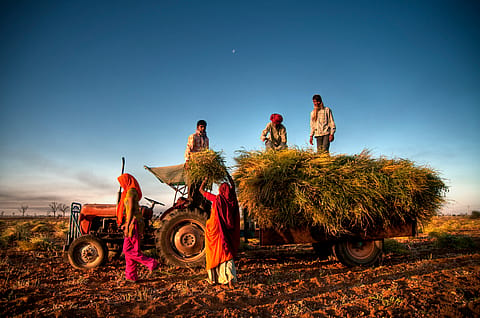Trade talks: Agriculture a genuine concern for India, sliding protection an option, says economist Pravin Krishna
Earlier this week, commerce minister Piyush Goyal also said a US-India bilateral trade deal is likely to be finalised by December this year.

India's concerns on opening up the agriculture sector in bilateral trade agreements are "important", and a sliding scale of protection--to be withdrawn over a period of time--could be an option in negotiations with the US, said economist Pravin Krishna from Johns Hopkins University.
Krishna, a Chung Ju Yung Distinguished Professor of International Economics and Business at Johns Hopkins University, who was in Delhi for the Kautilya Economic Conclave, 2025, told Fortune India that every country, including India, has its concerns on matters like these.
"I do agree that India has a vulnerable agriculture sector. It is a large sector. A lot of poor people are dependent on the sector," Krishna told Fortune India.
"And agriculture is a very important concern for India. The question is, how do we address this? How much should we protect the farmers?" said Krishna.
He suggests a sliding scale of protections specifically for agriculture for a specific period. "Should we have a sliding scale of protection where we enter the agreement now and say over the next 15 or 20 years, the sliding scale of protection could be gradually taken off. This way, everybody has time to prepare," he told Fortune India.
"The other option is to exempt agriculture altogether. And talk about everything else. So I think, in principle, everything is on the table. So one can negotiate," Krishna said.
"So, how does one cater to that genuine, economic moral question, while doing the other things, is a question that the government needs to think about," Krishna said.
Recommended Stories
India-US trade talks have restarted after a brief pause over the Trump administration's decision to impose a 50% tariff on Indian imports. This includes 25% penal tariffs for buying Russian oil.
The US wants market access in India's agriculture and dairy sectors, which is not agreeable to the Indian side. Formal talks stalled in August this year after the US cancelled the visit of a trade delegation at the end of August.
Hopes of progress in trade talks between the trading partners renewed as Prime Minister Narendra Modi on Thursday welcomed the U.S.-brokered trade pact between Israel and Hamas and spoke with U.S. President Donald Trump.
"Spoke to my friend, President Trump and congratulated him on the success of the historic Gaza peace plan. Also reviewed the good progress achieved in trade negotiations. Agreed to stay in close touch over the coming weeks," Modi said in a post on X.
(INR CR)
Earlier this week, Commerce Minister Piyush Goyal also said a US-India bilateral trade deal is likely to be finalised by December this year.